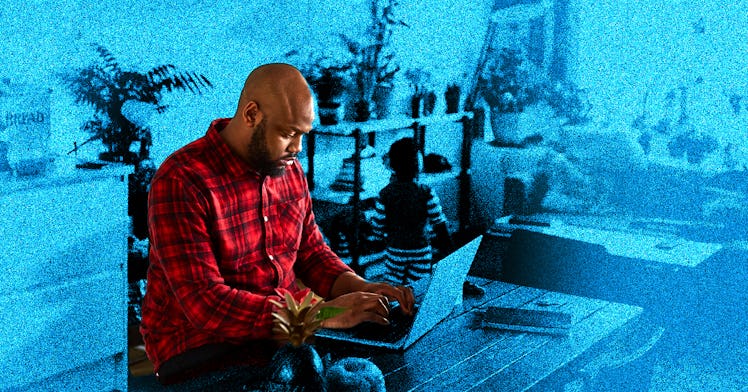Work From Home? Here’s How to Stay Focused When Constantly Interrupted
Dad? Dad! Daaaad! Daaaaaaad!

Two months into working from home, consistency can still seem more like a myth. You can get chunks of unbroken time, but you also get plenty of interruptions from the kids. Sometimes they’re important. Most of the time, they could wait. But with each one, you have to continually re-find your focus and you wish that didn’t have to happen.
Before your frustration redlines, there are a few important things to realize about distractions. They’re helpful (think: “Dad, I hear a tank rumbling towards the house!”) You’ve always been dealing with them. In a restaurant. At the gym. At work. You’re constantly assessing how and if to respond to them. And they’re not going to stop because, as Aaron Seitz, professor of psychiatry and director of the Brain Game Center at University of California, Riverside, “the brain is an information processing machine.”
One function of the machine is that it’s good at ignoring what’s familiar, like the house odor that’s always been there but only noticed when you come back from vacation. But now your work and office are the same, and all the inputs have shifted.
“Your brain is getting pulled in a lot of different directions,” says Michael Esterman, associate professor in the department of psychiatry at Boston University School of Medicine and co-director of the Boston Learning and Attention Laboratory.
One key difference is that these are your kids, the most important distractions that you have. Your setting will naturally be higher as you’ll wonder if someone is bleeding in the other room or worry that it’s a little too quiet, concerns that never enter your head at the office.
Add one more angle to the mix. Distractions aren’t only external stimuli, but your own thoughts, Esterman says. The mind likes to wander about 47 percent of the time and it doesn’t usually lead to happy places. Now this pandemic has dropped a truckload of worries about bills, job security, and safety into the mix.
“Everyone’s executive functioning is tapped right now,” says Jill A. Stoddard, licensed psychologist in San Diego, California and author of Be Mighty. “It increases the anxiety and makes people focus on threats, making them more forgetful and more likely to be distracted.”
So how do you work amidst constant interruptions? Your first step is accepting the interruptions and their unavoidable inefficiency. Esterman explains that whenever you go from Activity A to Activity B and back to A, the brain has to reconfigure the patterns and that takes time. It’s like a pitcher who’s cruising on the mound, then takes a ball off the shin. He needs a few warm-up pitches to get back into rhythm.
The good thing is that switching is a skill, and like all skills it can be practiced, Seitz says. But before you do that, you need to be calm. Stoddard recommends a 1-2-3 method. Take one deep breath and let it out. Pick out two objects and notice their details. Finally, close your eyes and listen for three different sounds. It’s all done in under 30 seconds, and “You map your track back into the present,” she says.
You can also listen to a song, focusing on specific instruments for varying amounts of time – five seconds for the drums, 15 for the guitar, seven for the piano. Incorporating your senses, per Stoddard, “snaps you back into the present,” and you’re building flexibility by “choosing where to put your attention and for how long to put it there.”
Once calm, practice disrupting yourself, Seitz says. Take short breaks; do something else; then return to your work. You can have your kids play Distract Dad for 15 minutes. You get more practice. It uses their energy for good, and they might start learning, “Oh, this is when we can come in,” offering a way to lessen the interruptions. (Seitz does have a caveat. His suggestions have not been tested, but the ideas that practice can improve a behavior and repetition forms a new habit, on which they’re based, are solid concepts.)
Esterman adds that it helps to know when you’re least likely to be bothered, and do the high-focus work then. Otherwise, stick to the more mindless, repeatable tasks. But because it’s hard to predict anything, at this unprecedented time, “You have to up your game,” Seitz says. This means expecting distractions and preparing, like how you regularly hit save on a document, just in case there’s a power disruption.
So, flexibility is one component. The other is keeping things simple and taking steps you usually wouldn’t in order to stay organized. Or, as Stoddard describes them, “Hacks for keeping your shit together.” Make a to-list, or, when you know a break is coming, jot down some keywords to hold your place. The act of writing not only helps you organize your thoughts but also lets you create a record to refer to later.
Finally, there’s another mindset shift, a kind of corollary to Interruptions Will Happen, which keeps the tension down. It’s called Breaks Are Good. You always strive for that long groove to burrow into a project, but there comes a point of saturation, where fatigue sets in and productivity stalls, Seitz says. Like your kids, you need a recess – they’re scheduled a few times a day at school for a reason. “Breaks are healthy,” he says. “They get you out of your ruts. They help you refocus.”
And when you take that attitude, the interruptions still might not be welcomed, but they’ll feel less disruptive. “The more you accept it, the less impact it will have,’” Seitz says. “The more normal things are, the less resources you devote to them.”
This article was originally published on